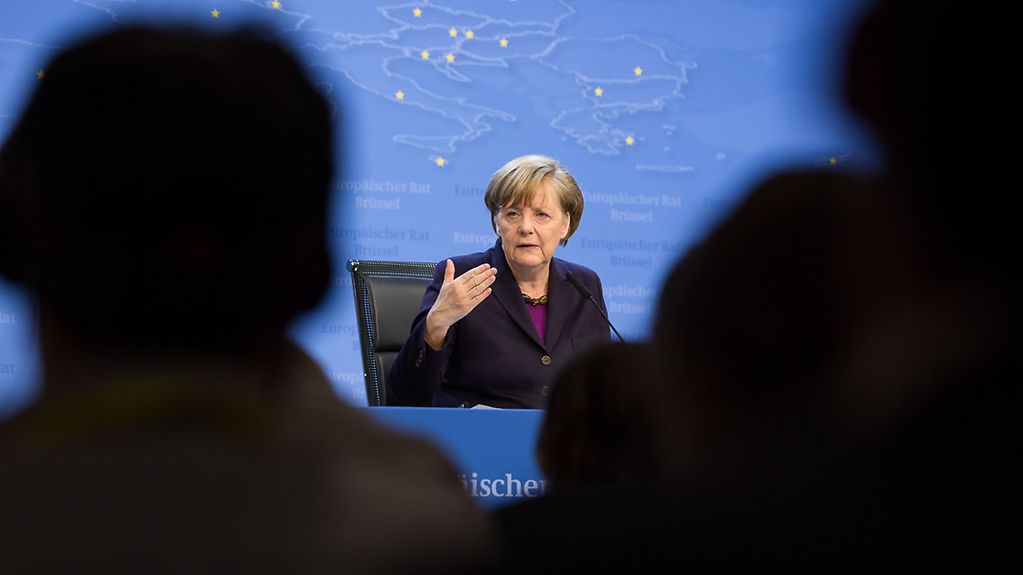European Council
Chancellor Angela Merkel is satisfied with the conclusions of the European Council. The heads of state and government called for more competitive industry in Europe as a driver of growth and jobs. The first signs of growth can already be seen.

Economic recovery in the euro zone remains fragile, but progress is tangible
Photo: Bundesregierung/Kugler
"It was an intensive Council meeting. No matter how difficult the problem facing us, no matter how challenging the task ahead, we have agreed on a common position. Europe has demonstrated once again that it can respond with one very resolute voice to current challenges," declared Chancellor Angela Merkel, reporting on the European Council meeting.
As expected, the European Council agreed to extend sanctions against Russia. "We have once again made it clear that should there be any further escalation regarding Ukraine, we are ready to proceed to stage three. This would involve so-called economic sanctions," explained the Chancellor.
Making the EU more competitive
Alongside Ukraine, which was top of the agenda, the European Council looked at the economic situation after the first phase of the European Semester. The Chancellor noted that, "The euro zone is no longer in recession." There are signs of growth, imbalances are being corrected and consolidation efforts are making progress. In 2014 the deficit of the euro zone will once again be less than three per cent of the gross domestic product (GDP).
The European Council aims to step up industrial competitiveness. Between 2000 and 2013 the percentage of GDP accounted for by industrial production slipped from 18 to 15 per cent. The Council has now undertaken to reverse this trend by 2020, reported Angela Merkel.
For this we will have to cut red tape, make swift progress in establishing the digital economy, step up the number of patents held, and improve the energy framework for industry. The Transatlantic Free Trade Agreement between the EU and the USA is also "an important factor in improving opportunities for growth," declared the Chancellor after the summit meeting.
Angela Merkel calls for solidarity in energy supplies
In autumn the European Council intends to adopt a new policy framework on energy and climate. This will be based on the proposal of the European Commission to reduce CO2 emissions by 40 per cent by 2030, and to raise the percentage of energy generated from renewables to a minimum of 27 per cent.
The Chancellor saw this as a good starting point. Since the target is a pan-European target, the contributions of the individual countries can vary widely. With a view to more sceptical states, like Poland, this, "opens up new scope for negotiations".
The Council also discussed in detail energy supplies and ways of diversifying energy systems. The Commission was mandated to produce a study of energy dependence in the EU by June 2014. The Chancellor underlined the importance of solidarity among member states in matters of energy supplies.
Equal partnership between EU and Africa
The foreign-policy part of the meeting focused also on preparations for the EU-Africa Summit, which is to take place in April in Brussels. The German government continues to concentrate on education and training, equipment and advisory services. What is needed is long-term cooperation between the EU and Africa.
Major milestone on the road to a banking union
On the first day of deliberations, the European Council praised the agreement now reached by the Council of Ministers and the European Parliament on the Single Resolution Mechanism to ensure the orderly resolution of failing financial institutions. Chancellor Angela Merkel termed this an important milestone which had not been easy to achieve. It is to be formally approved before the end of the Parliament’s current legislature in May 2014. "Then the banking union will constitute another important pillar in the architecture of the euro, and we cannot overstate the importance of this," declared Angela Merkel.
The heads of state and government agreed on the first day of deliberations on a Directive on the taxation of savings income. The Council will formally adopt this at its next meeting explained the Chancellor.